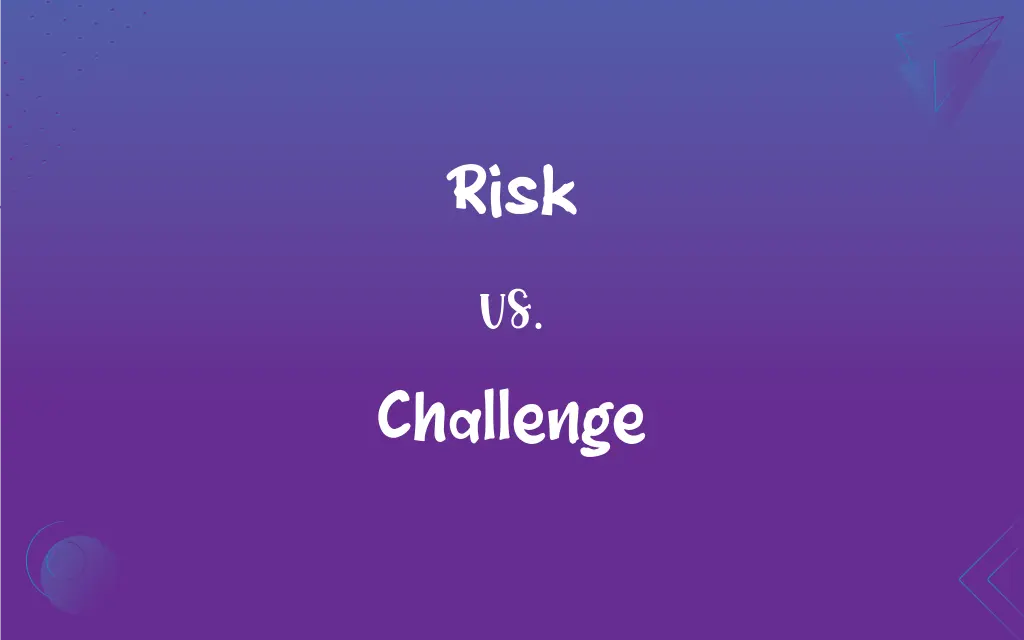Risk vs. Challenge: What's the Difference?
Edited by Aimie Carlson || By Janet White || Published on March 3, 2024
Risk involves potential loss or harm; a challenge is a difficult task requiring effort to overcome.

Key Differences
Risk implies a situation involving exposure to danger, harm, or loss. It is inherent in actions that lead to uncertain outcomes, where the possibility of negative consequences is a significant concern. Risks are evaluated based on their likelihood and the severity of the potential loss or damage. Engaging with risk often requires a calculation of potential downsides versus the benefits of taking that risk. A challenge, in contrast, refers to a task or situation that tests someone's abilities. It is characterized by obstacles that require effort, skill, or determination to overcome. Challenges can be sought out or encountered as part of a process or journey, serving as opportunities for growth, learning, and achievement.
Risks can be inherent in challenges, as undertaking difficult tasks often involves uncertain outcomes and the possibility of failure. However, the primary distinction lies in the nature of the engagement: dealing with risk focuses on managing potential negative outcomes, while facing challenges is about overcoming barriers to reach a goal. The approach to a risk is often cautious and calculated, whereas the approach to a challenge is proactive and determined.
Risks are assessed and managed to minimize potential losses, challenges are embraced as opportunities for development. The mindset required to handle risks involves preparedness, analysis, and sometimes avoidance, aiming to protect oneself or one's assets. Conversely, the mindset for tackling challenges is geared towards growth, learning, and pushing beyond comfort zones. Challenges are often seen as positive and motivating, even when they involve risk.
Risk and challenge are two sides of the coin of endeavor and achievement. Risk management is about minimizing and preparing for the potential downsides of actions taken, while embracing challenges is about maximizing personal and professional growth by overcoming difficulties. Both are integral to decision-making and progress, each requiring a different set of strategies and attitudes for effective engagement.
Comparison Chart
Definition
Potential for experiencing harm, loss, or negative outcomes.
A task or situation that tests one's abilities, requiring effort to overcome.
ADVERTISEMENT
Focus
Managing potential negative outcomes.
Overcoming barriers and difficulties.
Outcome
Can lead to loss, harm, or failure.
Leads to growth, learning, or achievement.
Approach
Often involves caution, analysis, and sometimes avoidance.
Involves determination, skill, and effort.
Perception
Generally viewed as negative or a threat.
Seen as positive, an opportunity for improvement.
Risk and Challenge Definitions
Risk
Risk is the exposure to danger or uncertainty.
Skydiving presents a significant risk due to its high altitude and speed.
ADVERTISEMENT
Challenge
A challenge tests skills, determination, or resources.
The new project was a challenge due to its tight deadline and complex requirements.
Risk
Risk is a situation involving exposure to potential harm.
Starting a new business carries the risk of financial failure.
Challenge
A challenge requires facing and overcoming obstacles.
Moving to a new country presented a challenge with its language and cultural barriers.
Risk
Risk refers to the possibility of loss or injury.
Investing in the stock market involves the risk of losing money.
Challenge
A challenge is an invitation to compete or achieve something difficult.
The marathon was a challenge she set for herself to prove her endurance.
Risk
Risk denotes the chance of adverse effects from an action or decision.
Taking out a loan has the risk of accumulating debt.
Challenge
A challenge is an opportunity for growth or improvement.
The chess tournament was a challenge that improved his strategic thinking skills.
Risk
Risk involves the probability of negative outcomes.
Traveling to a conflict zone poses a risk to personal safety.
Challenge
A challenge is a demanding task that requires effort to overcome.
Climbing Mount Everest is a challenge that many mountaineers aspire to.
Risk
The possibility of suffering harm or loss; danger.
FAQs
How do risk and challenge differ?
Risk focuses on potential negative outcomes, while a challenge is about overcoming obstacles for growth.
What is risk?
Risk is the potential for experiencing harm, loss, or negative outcomes.
Can a challenge include risks?
Yes, challenges can include risks as part of the obstacles to overcome.
How can risks be managed?
Risks can be managed through analysis, preparation, and mitigation strategies.
How should one approach a challenge?
Challenges should be approached with determination, skill, and effort to overcome.
What role does risk play in decision-making?
Risk assessment is crucial in decision-making to weigh potential downsides against benefits.
How can challenges improve skills?
Facing and overcoming challenges can sharpen abilities and foster personal development.
Is risk always negative?
While risk involves potential negatives, managing risks effectively can lead to positive outcomes.
What is a challenge?
A challenge is a difficult task or situation that tests someone's abilities.
Can taking risks be rewarding?
Yes, taking calculated risks can lead to significant rewards and achievements.
Do challenges have to be difficult?
Challenges vary in difficulty, but they require effort and perseverance to overcome.
Can risk-taking lead to innovation?
Yes, taking risks can drive innovation by encouraging exploration of new ideas.
Are challenges beneficial?
Yes, challenges are opportunities for growth, learning, and achievement.
How do businesses manage risks?
Businesses manage risks through strategic planning, insurance, and risk mitigation practices.
Are all risks avoidable?
Not all risks are avoidable; some must be managed or accepted in pursuit of goals.
Can risk be positive?
Risk itself implies potential negatives, but taking risks can have positive outcomes.
What makes a challenge rewarding?
Overcoming challenges is rewarding due to the sense of achievement and growth it brings.
Why do people seek out challenges?
People seek out challenges for personal growth, achievement, and to test their limits.
How does one identify a risk?
Identifying risks involves analyzing potential negative outcomes of actions or decisions.
What is the benefit of facing challenges?
Facing challenges benefits individuals by improving skills, resilience, and confidence.
About Author
Written by
Janet WhiteJanet White has been an esteemed writer and blogger for Difference Wiki. Holding a Master's degree in Science and Medical Journalism from the prestigious Boston University, she has consistently demonstrated her expertise and passion for her field. When she's not immersed in her work, Janet relishes her time exercising, delving into a good book, and cherishing moments with friends and family.
Edited by
Aimie CarlsonAimie Carlson, holding a master's degree in English literature, is a fervent English language enthusiast. She lends her writing talents to Difference Wiki, a prominent website that specializes in comparisons, offering readers insightful analyses that both captivate and inform.
































































